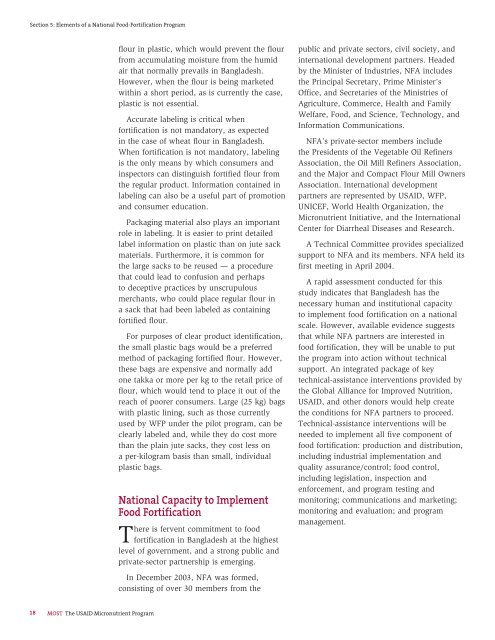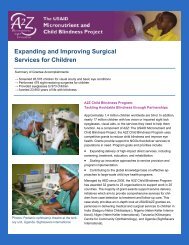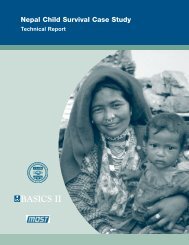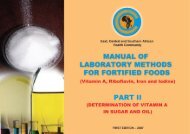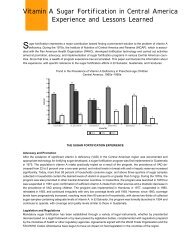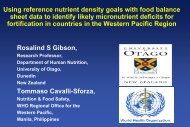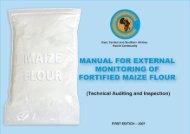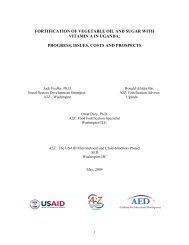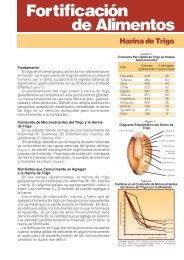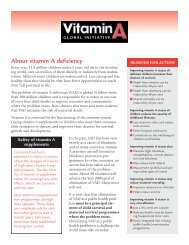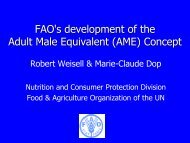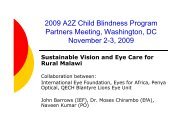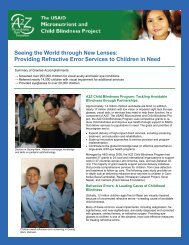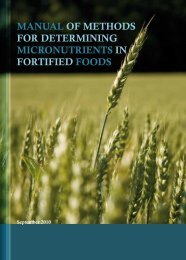Elements of a National Food- Fortification Program for Bangladesh
Elements of a National Food- Fortification Program for Bangladesh
Elements of a National Food- Fortification Program for Bangladesh
Create successful ePaper yourself
Turn your PDF publications into a flip-book with our unique Google optimized e-Paper software.
Section 5: <strong>Elements</strong> <strong>of</strong> a <strong>National</strong> <strong>Food</strong>-<strong>Fortification</strong> <strong>Program</strong>flour in plastic, which would prevent the flourfrom accumulating moisture from the humidair that normally prevails in <strong>Bangladesh</strong>.However, when the flour is being marketedwithin a short period, as is currently the case,plastic is not essential.Accurate labeling is critical when<strong>for</strong>tification is not mandatory, as expectedin the case <strong>of</strong> wheat flour in <strong>Bangladesh</strong>.When <strong>for</strong>tification is not mandatory, labelingis the only means by which consumers andinspectors can distinguish <strong>for</strong>tified flour fromthe regular product. In<strong>for</strong>mation contained inlabeling can also be a useful part <strong>of</strong> promotionand consumer education.Packaging material also plays an importantrole in labeling. It is easier to print detailedlabel in<strong>for</strong>mation on plastic than on jute sackmaterials. Furthermore, it is common <strong>for</strong>the large sacks to be reused — a procedurethat could lead to confusion and perhapsto deceptive practices by unscrupulousmerchants, who could place regular flour ina sack that had been labeled as containing<strong>for</strong>tified flour.For purposes <strong>of</strong> clear product identification,the small plastic bags would be a preferredmethod <strong>of</strong> packaging <strong>for</strong>tified flour. However,these bags are expensive and normally addone takka or more per kg to the retail price <strong>of</strong>flour, which would tend to place it out <strong>of</strong> thereach <strong>of</strong> poorer consumers. Large (25 kg) bagswith plastic lining, such as those currentlyused by WFP under the pilot program, can beclearly labeled and, while they do cost morethan the plain jute sacks, they cost less ona per-kilogram basis than small, individualplastic bags.<strong>National</strong> Capacity to Implement<strong>Food</strong> <strong>Fortification</strong>There is fervent commitment to food<strong>for</strong>tification in <strong>Bangladesh</strong> at the highestlevel <strong>of</strong> government, and a strong public andprivate-sector partnership is emerging.public and private sectors, civil society, andinternational development partners. Headedby the Minister <strong>of</strong> Industries, NFA includesthe Principal Secretary, Prime Minister’sOffice, and Secretaries <strong>of</strong> the Ministries <strong>of</strong>Agriculture, Commerce, Health and FamilyWelfare, <strong>Food</strong>, and Science, Technology, andIn<strong>for</strong>mation Communications.NFA’s private-sector members includethe Presidents <strong>of</strong> the Vegetable Oil RefinersAssociation, the Oil Mill Refiners Association,and the Major and Compact Flour Mill OwnersAssociation. International developmentpartners are represented by USAID, WFP,UNICEF, World Health Organization, theMicronutrient Initiative, and the InternationalCenter <strong>for</strong> Diarrheal Diseases and Research.A Technical Committee provides specializedsupport to NFA and its members. NFA held itsfirst meeting in April 2004.A rapid assessment conducted <strong>for</strong> thisstudy indicates that <strong>Bangladesh</strong> has thenecessary human and institutional capacityto implement food <strong>for</strong>tification on a nationalscale. However, available evidence suggeststhat while NFA partners are interested infood <strong>for</strong>tification, they will be unable to putthe program into action without technicalsupport. An integrated package <strong>of</strong> keytechnical-assistance interventions provided bythe Global Alliance <strong>for</strong> Improved Nutrition,USAID, and other donors would help createthe conditions <strong>for</strong> NFA partners to proceed.Technical-assistance interventions will beneeded to implement all five component <strong>of</strong>food <strong>for</strong>tification: production and distribution,including industrial implementation andquality assurance/control; food control,including legislation, inspection anden<strong>for</strong>cement, and program testing andmonitoring; communications and marketing;monitoring and evaluation; and programmanagement.In December 2003, NFA was <strong>for</strong>med,consisting <strong>of</strong> over 30 members from the18MOST The USAID Micronutrient <strong>Program</strong>


